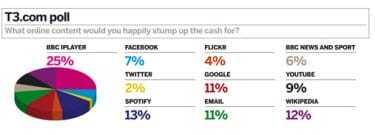People will not pay for the services you provide online. That’s the stark conclusion you could draw from a new survey which looked at whether or not people would subscribe to popular Internet services, such as YouTube, Wikipedia or the BBC iPlayer. The survey found that the vast majority of people simply will not pull out their credit card to pay for material they already get free of charge. The biggest proportion of people prepared to pay was 25% for the BBC iPlayer, but only 2%, for instance, would pay for Twitter.

The survey comes at a time when payment for online services is under scrutiny anyway. Rupert Murdoch, for instance, recently said that his organisation would be charging for some of its content within the coming year. Meanwhile, the founder of Twitter, Biz Stone, has also been discussing how the site can make money from subscription services and add-on utilities. Clearly both Murdoch and Stone may well have their work cut out if so few people are prepared to pay for what they offer.
Here’s the problem: in the past, before the Internet came along, information was in the hands of the few. As a result it was something we were prepared to pay for. Businesses used to hire researchers, consultants and “information scientists” to get the material they needed to conduct their business effectively. Then, along came the web and much of that previously hidden information became public. Now, we’ve had almost 15 years of free information – and there appears to be no going back.
At least that’s what this survey would have us believe. Organisations such as the Murdoch empire have made their money in the past decades from advertising that surrounds their free content. That content, though, is very generalised. Although it serves a definitive demographic, such as Times readers, it is still general and widely available elsewhere.
Compare that with specific information that is highly focused on a very tight marketplace, perhaps with only hundreds of potential buyers, instead of thousands. That kind of business is alive and well and highly saleable online. The concept of the niche “membership” site, which attracts high paying subscribers is doing very well indeed. In fact, according to some of the proponents of this model, such as Yaro Starak, you can easily make money with it.
Big businesses that have survived for centuries in some cases on the “general information” model are in trouble. People will no longer pay for such generalised material and they also don’t support the advertising as much as they used to. However, niche, targeted information really does sell. So if you run an online business it’s well worth considering could you narrow your material even further to target more specific markets – and thereby charge even higher prices.
As for big business – well the world has forever changed for them, and as yet, they seem unprepared. Simply switching from advertising support to subscription funding will not work. They need a wholesale change of thinking from providing general information, to targeting specific audiences. Unless your business also narrows its focus, people will not pay – and that means they will expect whatever you supply to be free of charge.
